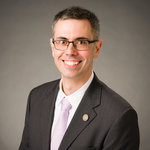





When he ran for office, Andrew Johnson figured he’d serve for about 10 years and then make way for new representation. That decade will be up in 2023, and he announced in mid-October 2022 that he doesn’t plan to run again. He timed his announcement to leave space for new candidates to campaign.
“This is more than a full-time job,” Johnson observed. “It’s very demanding and stressful, but also extremely fulfilling to be able to make a difference in the community.”
‘YOU HAVE TO DO A LOT OF SHOWING UP’
Johnson is proud of the team members he’s worked with over the years, which currently includes senior policy aide Kate Nelson and policy aide Dylan Kesti. Suzanne Murphy served as a longtime senior policy aide.
Four past team members have run for office themselves. Ilhan Omar as Minnesota’s 5th Congressional District Representative, Kate Agnew as Edina City Council Member, Chris Meyer as Minneapolis Parks and Recreation Board Member, and Christian Torkelson as Little Canada City Council Member.
“It is energizing to be around people who are excited and passionate about public service,” said Johnson.
He observed, “Anyone can make the leap into public service. I hope someone out there takes that next step and makes that transition.”
There are many aspects to being on the council, Johnson pointed out. “There’s communication. There’s organizing. Problem solving. Research. Listening. Working with others.
“You have to do a lot of showing up to community spaces and events. Being able to be present is really important.”
A good council member will love the community and want to help solve problems and make it better. “You want to leave it better than when you found it,” said Johnson. Part of the job is engaging with other community volunteers.
Johnson remarked that some people may have the skills for a good campaign but not for the role of council member, while others may not be good on a campaign but have the skills needed to be on the council. But both are part of the job of a council member.
The act of running for office can be exhausting, but it is also an incredible experience, according to Johnson. “You get to meet thousands of people and hear their stories and hopes and concerns and dreams for the city. That is such a gift. There’s nothing like it.”
For those interested in the role, the next step is to work with residents to get their support. In late winter/early spring, the Minneapolis DFL will hold its convention, and officially endorse one candidate. The candidate filing period opens Friday, Aug. 1, 2023 and closes Aug. 15. The ranked choice general election is on the first Tuesday in November. More information will be posted on the city website following the conclusion of this year’s election cycle.
“I want there to be several highly qualified and skilled candidates with diverse backgrounds and interests for voters to chose among because that’s what will serve our ward well. Democracy is a beautiful thing.”
‘AMAZING AND HUMBLING OPPORTUNITY’
Now 38, Johnson was the youngest member on the council when he started and the first Millennial to sit on the Minneapolis City Council. He came from a career in IT, working at Target and running his own business on the side. He has battled glaucoma, and decided to make the most of every minute because life is not guaranteed.
Johnson’s journey into public service began shortly after he purchased a home in Longfellow and attended the Longfellow Community Council annual meeting. He walked out a new board member, and was elected as board president after his first term.
Johnson married Sara Vine in 2016. He has welcomed two sons over the past few years, Elliot and Ben, who spent six weeks in the Fairview Masonic Children’s Hospital NICU earlier this year right after his birth.
He’s learned how to be a leader by sitting on the council. “I’ve learned how to effect change using processes. I’ve built strong relationships and worked with others to get things done. I’m often the deciding vote and able to shape some of the biggest issues before our city.”
AN IDEAS PERSON
There’s a lot that Johnson is proud of, and more he plans to do with the last 14 months of his term.
He intends to continue working to bridge a compromise between the city, public works and the East Phillips Neighborhood Initiative regarding the former Roof Depot site. He wants to see a better solution to the city’s sidewalks in the winter when they’re covered by snow and ice, a problem he views as a public safety issue. While the wait times on Hiawatha Ave. due to the light rail are better than they were, he recognizes that it’s still tough on residents, and he hopes to implement better technology to deal with the directive to get eastbound traffic moving first to get them out of the way of an oncoming train. This means that the rotation is reset every time there is a train, and can leave other directions stuck idle for long periods of time.
He’s currently the chair of the Northern Lights Express Alliance and says they’re close to getting high-speed passenger rail between Target Field Station in Minneapolis and Union Depot in Duluth.
“When I ran for office, I ran as an ideas person,” he observed. He has approached the work by identifying problems and seeking solutions.
One solution was the formation of a small business office. Prior to this, the direction was to put demands on small businesses, but now city staff seek to work with small businesses to get them what they need. In the past, it was confusing for small business owners and entrepreneurs to figure out what the city’s rules and regulations were, and difficult to figure out what resources there were. With the new office, there is a small business portal to help demystify the process, pointed out Johnson. “We want entrepreneurs to be successful. It adds value to a community, creates jobs and services, and makes Minneapolis a great place.” They’ve also begun reaching out to businesses to see what they need, versus waiting to be contacted. “I think that makes a big difference,” said Johnson.
When his aide Suzanne Murphy became pregnant, Johnson learned that the city didn’t offer paid parental leave to its 4,000 employees, but instead required parents to either use vacation or sick time when their children were born or adopted. He helped lead the effort to change that, and then worked to add paid sick leave for all employees.
There was this incentive for workers to come in sick before, pointed out Johnson, because they needed to pay their rent and buy groceries.
The Sick and Safe Time Ordinance took effect July 1, 2017 – which meant it was in place when COVID-19 hit. Employers with six or more employees must provide paid sick and safe time in the city. This affects 100,000 workers in the city.
The Sick and Safe Time ordinance almost didn’t pass, recalled Johnson. It became part of a larger package, the Working Families Agenda that also included minimum wage, predictable scheduling, and wage theft. “It became too much to pass on its own,” said Johnson. He suggested that a work group be developed to study just the sick and safe time component, and it moved ahead from there. It took working with community partners and building support to get it passed.
In hindsight, another work group laid the groundwork for bigger changes in the city as it relates to policing. People were already talking about defunding the police in 2018 when the 911 work group was formed. Various people served on the work group, including police, and discussed how some things could be done more efficiently and effectively if police officers weren’t doing them. This led to the recommendation that theft reports be taken by 311 or online, parking-related calls go to traffic control, and that there be a non-emergency mental health line. Embedding mental health professionals in the Fire Department, police and 911 were also part of the recommendations.
This effort resulted in the creation of the Behavioral Crisis Response Team that has successfully answered thousands of calls without needing police back-up, and is appreciated by the police department.
Johnson also worked at add items to the city’s website to make it easier for residents to get city data.
IMPACT OF GEORGE FLOYD'S MURDER
Serving on the council now feels like a different job from when he began. Part of that is being on this side of George Floyd’s murder by Minneapolis Officer Derek Chauvin (with three others also facing charges). Another piece is that he can’t just go to a city worker to get information anymore.
You can’t pick the challenges you’ll face, he pointed out. “To know you helped make things better despite the circumstances feels good.”
Aside from having a son in the NICU for six weeks, the murder of George Floyd was the worst moment in his life. Viewing the footage of Floyd’s murder made him want to go back in time and stop it, said Johnson. “It’s traumatic to even watch. It induced a rage. It’s like, I can’t believe this is happening. How could this happen?”
Then he watched the community he loves so much burn and saw the fear residents had.
As a Longfellow resident who lives one mile from the Third Precinct, Johnson woke up every morning during the Uprising and saw ashes on his yard. He smelled smoke at home. “It was like living in a war zone,” he recalled. “You can participate in the righteous anger over George’s Floyd’s murder and the racial reckoning, and also feel so upset by what is happening to the community. Everyone was grieving.” He watched neighbors band together at night to protect homes and businesses, and then get up to clean and rally together in the morning. There were peaceful protesters, and White supremacists in the midst.
He was frustrated by what happened because he knew that changes he’d pushed for and others had pushed for had not happened, and it resulted in the murder of George Floyd and the aftermath. “There’s a special kind of shock from the vantage of the council,” he said. “You see the sum of the issues added up in a unique way.”
He saw how Minneapolis Police Department has been an island in the city with oversight only by the mayor instead of the city council. He saw the gaps in the city’s body cam policy.
TRANSFER OF POWER FROM ELECTED OFFICIALS TO APPOINTED STAFF
The movement to consolidate power with the mayor has continued after question one was approved by voters last year. Because one person can’t be directly involved in everything, the mayor is currently working to set up new staff members who will manage things, such as the Public Safety Commissioner. Decisions will largely be made by these staff members.
“This has transfered power from the council to the mayor. In a larger sense, this has transfered power from elected officials to appointed individuals,” pointed out Johnson. “Whether that produces more accessibility and responsiveness for the public is a big open question.”
With that, there are fewer dollars going to neighborhoods to do engagement work while more requirements are being placed on them. The amount of money neighborhoods get seems to change based on who is on the council. “That’s not a recipe for stability or long-term planning,” he said. He thinks the only way that might change is with a charter amendment to designate a percentage of the city’s budget to neighborhood organizations.
As a city council member, Johnson can no longer go to a city worker and ask for information. Like it is with journalists, he is directed to specific gatekeepers and department heads. “Now everything seems really slow and there is less information than I was able to get before,” he said. He is not sure if this is the new norm, or part of the process of sorting out the new strong mayor system.
He is concerned to see power shift from elected officials into institutions. “There are trade-offs to any change,” said Johnson.
READY FOR A NEW CHALLENGE
Johnson is ready for a new challenge, he said, although he doesn’t know what that will be. He’ll be looking for something that uses the leadership skills he learned while in office.
With the new government structure and new ward boundaries, Johnson believes it is a good time to pass the torch to a new public servant. There is currently only one person on the council who has been there longer than him, and that is Ward 7 Member Lisa Goodman. He said he has engaged in self-reflection regularly over the last nine years, considering both his goals and what he brings to the ward.
He said, “It’s been an amazing and humbling opportunity.”
Comments
No comments on this item Please log in to comment by clicking here